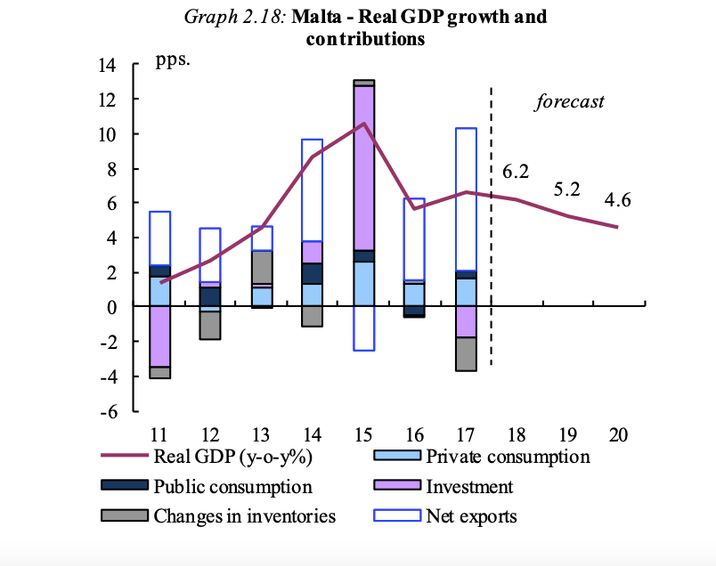The first countries to adapt bitcoin will be the ones who flourish the most

Cryptocurrencies have become a major talking point since they first pierced popular culture in 2017. Going from a relatively unknown, unstable market the current total worth of Bitcoin alone, as of June 2019 reached $41 Billion. This isn’t counting all of the other cryptocurrencies that are currently active in the industry at this time, combining those to the initial figure would give a large amount of value. From this value, nations who are quick to get behind the growing buzz of cryptocurrencies will be able to profit, through business tax, the jobs the cryptocurrencies will generate and much more. Some nations are already thinking about this and are exploring ways in which they can profit from the cryptocurrency boom.
How Blockchain Has Aided the Boom in Malta’s Economy
There has been much optimism about the economic growth of the small Mediterranean island in recent times, with growth in 2018 settling at 6.2%. This has been further compounded by the release of the European Commission’s annual growth forecasts for 2019, where Malta has appeared at the top of the list, with a growth expectancy of 5.2%. Ireland is the runner up in this aspect with a predicted growth of 4.1%.

One of the reasons for this explosion in economic growth can be attributed to the warm reception of cryptocurrencies in the country. Even other countries known for embracing technological advancements have fallen behind Malta in this aspect. A big part of the reason for this is due to the passing of ideal legislation surrounding blockchain and cryptocurrencies by the country’s Prime Minister, Joseph Muscat. This embrace of blockchain technology has allowed Malta to lure a number of well-known, sizable cryptocurrency operations onto the country’s shores. For example, BitBay, Zebpay, and Binance have all relocated from their native countries to Malta, so that they can enjoy a more comfortable regulatory environment.
How Blockchain is Permeating Education in Malta
Of course, all of these business ventures in Malta are going to need employees. In local news, Malta Today has quoted the European Commission’s report, stating that the new job opportunities provided by blockchain firms have been a key contributing factor in the nation’s economic resurgence. Interestingly, there has also been a movement towards initiatives to improve the growing blockchain market in Malta. Led by Oxford University researcher Joshua Broggi, the institution is going to be named Woolf University and will be aimed at offering a wide variety of courses, both on and off-campus. The idea is to offer tuition to people across the world by offering them a series of personalized tutorials that can be flexibly suited to the student. Interestingly, the university will be run entirely on blockchain technology, to avoid incurring expensive administrative costs through the automation of administrative processes. Furthermore, the security provided by blockchain technology will ensure that the university’s systems and degrees earned through them will be incredibly secure against attackers. These degrees can also be validated using blockchain technology. Students and staff at the university will sign-in through the use of smart contracts, that will confirm items to the institution, such as attendance and the completion of any assignments by students. Students will also be able to pay their tutors through the blockchain, whilst the university will provide students with micro-credits that can be directly applied to their degree. Broggi is planning to open five different sites for Woolf University, however, he has stated that due to the welcoming nature of Malta to blockchain technology, it was an obvious first choice. As one would expect, Broggi initially planned to raise funds for the university through an ICO, however, he eventually managed to find enough private finance so that he could avoid making a public offering. Woolf University has already garnered the attention of a number of professors from well-established, elite universities, such as Oxford, Cambridge, George Mason University, Kings College London, Leipzig University and Kyoto University. It should come as no surprise that the running of such an institution would also make a contribution to the Maltese economy by creating jobs for lecturers and generating more revenue on the island itself through tuition fees and student living.
The Future Outlook for Blockchain in Malta
Malta is rapidly earning the nickname of “Blockchain Island” due to its more reasonable approach to legislation surrounding blockchain and cryptocurrencies. The island nation is a great example of the potential for countries to make strides in their national economy by being more open-minded with the development of new financial technology and avoiding the usual trap that a lot of countries fall into, where they regulate the market so heavily that it is almost impossible for it to grow.
The figures from the European Commission support this line of thinking and if the development of cryptocurrencies and blockchain goes further in Malta, it won’t be a surprise to see even more companies relocating to the Mediterranean, to avoid overbearing regulation.